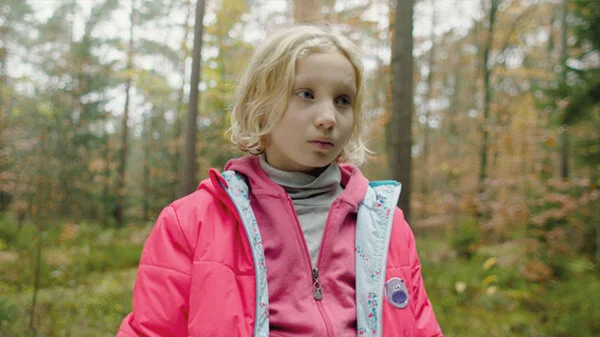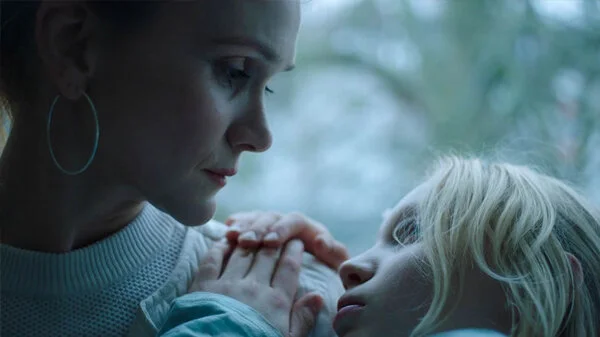Speaking to claustrophobic climates both past and present, Nora Fingscheidt’s debut feature frames a young girl looking for a home in an unstable world. Now released in an entirely digital release while the cinema landscape temporarily shifts, System Crasher is perfect isolation viewing to re-centre a worldview. Millicent Thomas speaks to Fingscheidt about the German foster care system, making a hero and antagonist out of one same character, and feeling panoramic empathy for little girls everywhere
In 2017, Nora Fingscheidt received the Berlinale Kompagnon Fellowship to support the development of her first feature length project. Fast forward two years and System Crasher welcomed nominations for Best Picture and Best Actress in the European Film Awards, and was Germany’s entry into the 92nd Academy Awards.
The film follows nine-year-old Benni (Helena Zengel), a ‘system crasher’ being passed around Germany’s foster homes. “Ever since I wanted to make movies, I’ve always wanted to make a film about a wild and angry little girl,” says Fingscheidt when I sit down with her at the 2019 BFI London Film Festival. “Even before I had a story, I always had this character with me.” Whilst studying film, the director took on various projects and volunteer work, and it was during one of these placements at Caritas (Germany’s Catholic welfare association) that she first came across the term that would become the title of her first feature. “They have a lot of state care institutions, and one was a shelter for homeless women. One day a 14-year-old girl moved in and I was so shocked. The social worker said to me, ‘Oh, it’s a system crasher, no institution in the whole country is daring to take that girl in.’” The term is a label given to children who bounce from home to home and generally fall through the cracks in the foster system. “In German, the term sounds really powerful, like a bomb explosion. But, at the same time, it describes something so tragic. That was the moment I thought now I have a story for my little girl.”
The film will no doubt make a star out of its lead, Helena Zengel. The 11-year-old is a powerhouse, with an infectious energy that’s one moment life-affirming and the next completely heart-breaking. “We met her in our very first casting session,” Fingscheidt says of the journey to find Benni. “When I was writing the script over four or five years, I kept thinking I’m never gonna find a girl, or if I did, her parents would never allow it.” But luck was on her side, as Zengel was girl number seven out of nearly 150 the team saw. “She was totally different than I imagined Benni, but it was amazing. It took about six months before I stopped seeing girls and went back to Helena, because I refused to believe it was going to be that easy.” Fingscheidt’s fears were also laid to rest when Zengel’s mother loved the script. “She totally understood why this was an important movie and she wanted to support it.”
The characters of System Crasher are not based on the people Fingscheidt met, they were instead inspired by the system as a whole. “After meeting the girls at the shelter (Caritas) I researched for about three years. I spent two weeks living in and observing various orphanages. I got inspiration from the atmosphere of different institutions. It’s important to see more than one, otherwise you see one and think that’s how it is.” When it came to the origin of pivotal characters such as Benni’s mother (Lisa Hagmeister) and Micha (Albrecht Schuch), her new school escort who she becomes dangerously close to, Fingscheidt built on a myriad of real people she met during her research. “I talked with maybe 100 different people who work in all kinds of fields with children like Benni. Benni herself is built from probably 20 different children.”
There are countless little moments in System Crasher that feel documentary-like, largely due to the stellar performances and an unobtrusive camera from cinematographer Yunus Roy Imer. Fingscheidt also credits this to Zengel’s impressive understanding of the character, “When we started shooting she could already jump in and out of Benni perfectly. There was one scene she improvised, when the kids are brushing their teeth and spitting toothpaste at each other, Benni starts to roar and turn into a little monster and that was just something she started doing herself but it felt so perfectly Benni.” However, working with such a young actress on quite a harrowing feature, there were some moments that proved tough. “When Micha lets her go in the forest, Helena found that incredibly difficult. She usually always understood Benni’s motivations, but here she was asking ‘why isn’t he following me?’ and it was hard to explain to her. It was the only scene where she kept asking and asking because she didn’t want to accept that he would let her go. She did it to protect her character, to protect Benni.”
As a viewer, it is never hard to sympathise with the young heroine, but during her increasingly violent outbursts it is often jarring, and moral stances become tangled as sympathy shifts to the children around her and the adults who are tasked with her care. Speaking on this tricky balancing act, Fingscheidt says, “It was a huge challenge to write a story where you don’t have an antagonist, but instead a character and the antagonist is within her. We fear for her from herself.” However, the director is careful to never place blame in System Crasher. Not on child services, their employees, Benni’s mother or Benni herself – there are no sides here. “It’s something that came up during research for sure. Since day one, I only ever met people who wanted to help the children. They often work under circumstances where there are too many children per adult, they’re paid very badly and there is no real support network.” Benni’s mother promises to take her home, but repeatedly breaks that promise as she fears for the safety of her younger siblings; it’s easy to feel angry for Benni, but through Fingscheidt’s lens we see the pain of the mother just as much. “When you hear the case study you think she’s a monster, how could she do that to her? But then you meet the person and it’s not so easy anymore. You meet a very weak, traumatised woman who actually loves her children but just has no stable surroundings or support.”
The question of stability is always looming over System Crasher. Every child just wants a home, and it’s no secret that those in the foster system are made to forge connections with people that are often just passing through. When Benni becomes attached to Micha, personal boundaries are crossed, as she thinks she has found a permanent home whilst he is just trying to do his job. It is a room full of adults deciding a child’s future, but Fingscheidt asks us unapologetically to consider what the child wants.
Millicent (@MillicentOnFilm) is a freelance journalist based between Manchester and Bath. She writes for publications such as GamesRadar, Dazed, Little White Lies, SciFiNow and more. She continues to defend Tomb Raider (2018) on Twitter.




